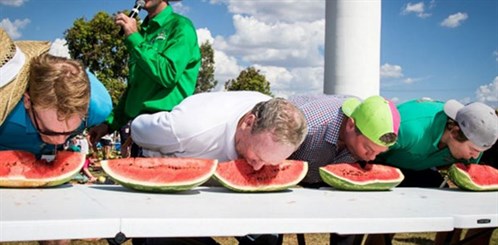Is this the most bizarre festival in Australia?

Another sticky, melon-covered body slips and smacks into a rapidly expanding mound of ravaged fruit.
Thousands revel in the joyous destruction that is watermelon-skiing as the sweet, juicy flesh sprays like blood and the crowd shouts encouragement.
On the ground, roughly 1100 melons lay like carcasses, the victims of watermelon-themed iron man, chariot racing and all manner of other quasi-sports with "multiple hazardous outcomes" where "injuries are likely" and melon madness is guaranteed.
The town's footy team and Bruce, the mechanical pulling machine, ensure the long, black, fruity slip-and-slide has a constant stream of willing victims in their watermelon clogs.
Across one weekend every second February, the population of this rural Australian town two hours' north-west of Toowoomba swells from 5500 to up to 15,000 in an ode to all that is melon.
From Thursday to Saturday just gone, more than 700 visitors pitched tents or parked caravans in town, with many more staying in other accommodation nearby or driving in for the day.
According to organisers, revellers ate more than 800 melons and smashed another 1100, roughly 20-25 tonnes in total, all donated by local farmers.
There were complaints of food wastage, but for farmers who might have earned a few dollars a kilo before Christmas, and much less now, it was melon well spent.

Two years ago, economic consultant Reuben Lawrence helped the Western Downs Council calculate the Chinchilla Melon Festival's economic value to the town.
Using attendance numbers of roughly 15,000 combined with average spend per day and a few other figures, they came to an estimated $3.5 million of benefit the festival brings to town.
According to festival president Doug McNally, that means each tonne of fruit destroyed or handed out brings in more than $125,000.
"That's some of the most profitable fruit you'll ever see," said Terry O'Leary, whose family was one of first to grow seedless melons.
Clearly, not all of that money went back to the farmers (Club Hotel owner Justin Burn, who supplied the festival as well as doing a roaring trade himself, guessed roughly 150,000 tinnies helped lubricate the masses) but Mr O'Leary said it was more than worth it.
Have you ever been to the Chinchilla Melon Festival?
Written by Jorge Branco. First appeared on Stuff.co.nz. Hero image credit: Stuff.co.nz/Jessica Courtnie Photography
